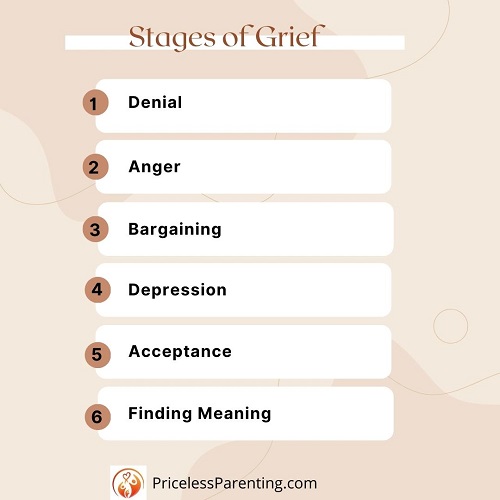Processing Grief and Finding Meaning
by Kathy Slattengren, M. Ed., Priceless Parenting (sign up for monthly parenting newsletter and receive 20+ printable charts for kids and parents)
(listen to article read by the author)

How do you handle life’s inevitable losses? How do you respond when your kids experience a loss? Losses come in different shapes and sizes. Your life experiences and beliefs shape your reaction.
Some parents try hard to protect their children from experiencing loss. They do their best to insure only positive experiences for their kids. Sadly, these efforts result in kids who lack resilience due to little practice in handling disappointments and losses.
Part of living is experiencing grief. There’s no way around it. Learning to face grief is key to getting through it.
Moving Through the Stages of Grief
You may feel a strong desire to protect your children from experiencing loss. However, it’s impossible to isolate your children from this part of life. A better approach is to help them acknowledge their loss and accompanying grief.
David Kessler has dedicated his life to helping people through their grief. Kessler experienced his mom dying when he was only 13 and later the sudden death of his 21-year old son David. He coauthored the classic
On Grief and Grieving book with Elisabeth Kübler-Ross.
More recently he wrote
Finding Meaning: The Sixth Stage of Grief.
Kessler added finding meaning as the sixth stage of grief. The stages of grief are:
1: Denial
2: Anger
3: Bargaining
4: Depression
5: Acceptance
6: Finding Meaning
These stages are not linear. You may not experience them in this order. You may jump back and forth between different stages. Your experience of grief will not be the same as your children or loved one’s experiences.
During the pandemic, the stages might look like
1: Denial – This virus won’t affect me or my community.
2: Anger – How dare you take away my freedom and tell me to stay home!
3: Bargaining – If I stay home for four weeks, I can then go back to normal.
4: Depression – There’s no end in sight. I’m so ready for this to be over.
5: Acceptance – I’ll do my part to stay safe. I’ll keep my distance, wash my hands and support the people who are caring for the sick and providing essential services.
6: Finding Meaning – I’m spending more time playing with my kids. I no longer feel like I’m in a rat race. I’m reflecting on my life at a deeper level.
Understanding these stages of grief can help you be more compassionate. Your teen may be angry about missing high school graduation and prom. You can listen without trying to reason with your child or convince them to feel differently.
The Finding Meaning stage is especially important when a loved one has died. Kessler writes "What does meaning look like? It can take many shapes, such as finding gratitude for the time they had with loved ones, or finding ways to commemorate and honor loved ones, or realizing the brevity and value of life and making that the springboard into some kind of major shift or change."
Letting Go of Control
When you are in grief, you are not always in control. You may find yourself unexpectedly overwhelmed with sadness. You aren’t in control of when these strong emotions arise.
Grief is a long, messy process. You can’t force yourself or anyone else through the stages of grief. This is especially difficult if you like being in control.
Monica was grieving the losses the pandemic brought to both her and her family. When she realized her brother’s family went to their cabin with friends despite the “shelter in place” order, she was furious. To top it off, her brother asked their mother to stay at their house and care for their 2-year-old when their baby arrived. Their mother is in her 70’s and has lung disease. Monica couldn’t believe her brother was ignoring the danger he was putting their mother in.
Monica felt like calling her brother and telling him off. She wisely took a moment to step back and seek advice. She realized yelling at her brother would damage their relationship. Her anger was not likely to get him to change his behavior.
The only thing she could control was her own behavior. She was
acting in alignment with her moral values by cooperating with the “shelter in place” order. She didn’t want to spend her precious energy being angry. She worked to let go of her repetitive thoughts about her brother’s behavior.
Finding ways to remain calm helped Monica feel more centered. Letting go of what she couldn’t control was key to her inner peace.
Standing On Grief’s Threshold
When you are grieving, you are standing on a threshold. There is life as it was before and life as it will be after. There is uncertainty and feelings of vulnerability.
Your future is not clear. You are waiting for what will come next. Sometimes all you can do is take it one moment at a time.
At times like these it’s helpful to be extra kind to yourself. Also be compassionate with others. Life is extremely difficult at times for each of us. Supporting each other through grief makes all the difference.